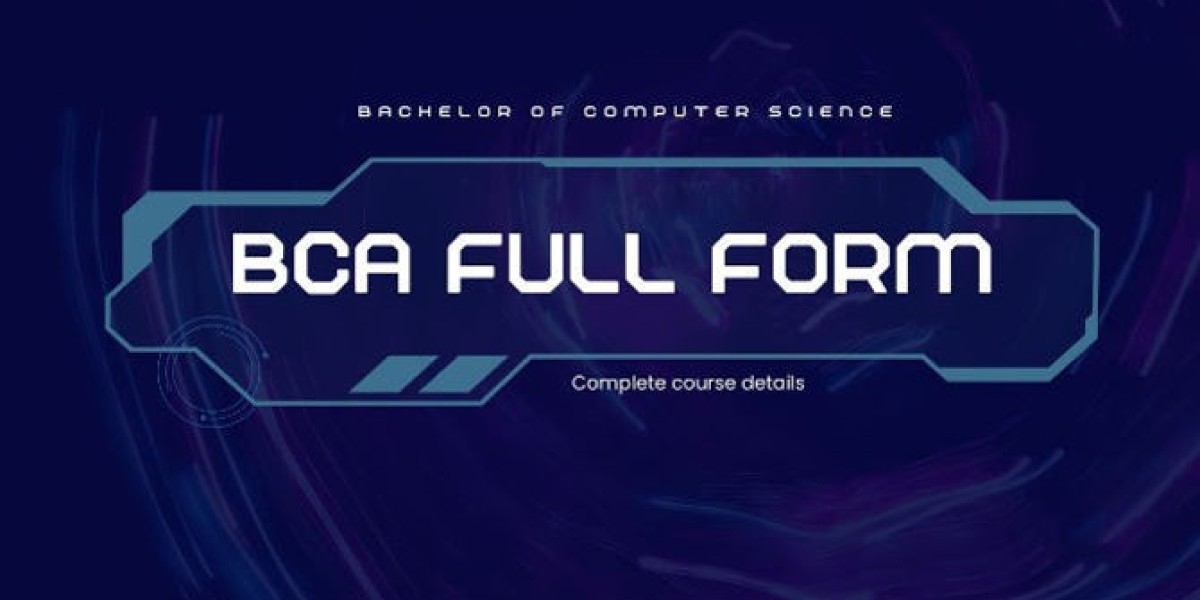In today’s digital age, the demand for skilled professionals in the field of computer science and technology has never been higher. One of the most popular courses that provide a solid foundation in this domain is BCA, or Bachelor of Computer Applications. The BCA full form, in simple terms, refers to a three-year undergraduate degree program that focuses on computer science and its various applications in the modern world. This article delves into the BCA full form, its significance, the curriculum, career prospects, and scope in today’s competitive job market.
What is the Full Form of BCA?
BCA stands for Bachelor of Computer Applications. It is an undergraduate degree program designed to provide students with a comprehensive understanding of computer science, its applications, and practical training in programming, web development, networking, and database management. The program generally spans three years and is available at various universities and colleges worldwide.
The BCA course curriculum includes subjects that focus on the technical aspects of computers, along with soft skills and management-related subjects. Upon completion of the course, graduates are equipped with the necessary skills to pursue careers in the IT sector, software development, web designing, and other fields related to computer applications.
The BCA Course Structure
BCA is typically a three-year program, divided into six semesters. During these semesters, students are introduced to a variety of subjects that provide a strong foundation in computer science. Some of the core subjects included in the BCA syllabus are:
Computer Fundamentals and Programming: Students learn the basics of computers, programming languages like C, C++, and Java, and other related topics. These subjects lay the groundwork for understanding how computers function and how to communicate with them through coding.
Database Management Systems (DBMS): This subject teaches students how to manage and organize large datasets using various database systems such as SQL, MySQL, and Oracle.
Web Development: Students are introduced to the basics of creating websites and web applications using HTML, CSS, JavaScript, and PHP.
Software Engineering: This subject focuses on the methods and principles involved in software development, including analysis, design, testing, and maintenance.
Computer Networks: This covers the concepts of networking, protocols, LANs, WANs, internet technologies, and network security.
Operating Systems: Students learn about the different operating systems used in modern computers, including Windows, Linux, and macOS, along with their functionalities and management.
Mathematics for Computing: This subject provides the essential mathematical foundation for computer science students, including topics like discrete mathematics, probability, and statistics.
Project Work and Internship: In the final year, students are required to work on a practical project that applies the concepts learned throughout the course. This is often accompanied by an internship in a relevant organization.
Key Skills Developed in BCA
While pursuing a BCA, students develop a range of technical and non-technical skills. Some of the key skills include:
Programming Skills: BCA students are trained in various programming languages like C, C++, Java, Python, and others, allowing them to develop software, websites, and applications.
Problem-Solving: The course encourages logical thinking and problem-solving abilities, essential for tackling complex issues in programming and software development.
Database Management: Students acquire the skills needed to handle and manage databases, a crucial aspect of many IT jobs.
Web Development: With the increasing demand for websites and online applications, the ability to design and develop websites is a valuable skill gained during the course.
Analytical Thinking: The curriculum encourages students to think critically and analytically, helping them break down problems into manageable parts and find efficient solutions.
Communication and Teamwork: As the course also includes group assignments and project work, students develop their communication and teamwork skills, which are important in the professional world.
Career Scope After BCA
The scope of a BCA degree is vast, offering graduates numerous opportunities in the IT and computer science industries. Here are some of the key career options for BCA graduates:
Software Developer: BCA graduates can work as software developers, designing and developing applications, software tools, and programs for various industries.
Web Developer: With knowledge of HTML, CSS, JavaScript, and other web technologies, BCA graduates can become web developers, building websites and web applications for businesses and organizations.
Database Administrator: As businesses increasingly rely on data, the demand for database administrators is growing. BCA graduates with expertise in database management systems can take on roles that involve managing and maintaining databases.
System Administrator: System administrators manage the hardware, software, and networks of an organization. They ensure that all systems are functioning smoothly and troubleshoot any technical issues.
Network Engineer: With knowledge of computer networks, BCA graduates can pursue careers as network engineers, responsible for setting up, managing, and maintaining computer networks.
Software Tester: Software testers are responsible for identifying bugs and issues in software applications before they are released to the public. BCA graduates can pursue this role to ensure the quality of software products.
Cyber Security Analyst: With the increasing threat of cyber-attacks, there is a rising demand for professionals who can protect and secure data. BCA graduates can work in cyber security, helping organizations safeguard their digital assets.
Mobile App Developer: With the rise of smartphones, mobile app development has become a lucrative career option. BCA graduates can specialize in developing mobile applications for Android and iOS platforms.
IT Support Specialist: BCA graduates can work as IT support specialists, providing technical assistance to businesses and individuals who face software or hardware issues.
Freelancer/Entrepreneur: For those who prefer flexibility, BCA graduates can choose to work as freelancers or even start their own tech company, offering services like software development, website design, and IT consulting.
Higher Studies After BCA
While the career prospects after completing a BCA are promising, many students choose to pursue higher studies to enhance their qualifications and increase their job prospects. Some of the popular options for further studies include:
MCA (Master of Computer Applications): This is a two-year postgraduate program that provides in-depth knowledge of computer applications. MCA is a popular choice for BCA graduates who want to specialize further in the field of computer science.
MBA (Master of Business Administration): Some BCA graduates choose to pursue an MBA to enter the field of management, which allows them to combine their technical skills with business acumen.
MSc in Computer Science: This is another postgraduate option for students who want to specialize in computer science and related fields.
Certifications and Diplomas: In addition to a master’s degree, BCA graduates can pursue certifications in specific technologies or programming languages, such as Python, Java, AWS, or blockchain development.
Conclusion
The BCA full form, which stands for Bachelor of Computer Applications, is an ideal program for students who are passionate about computers, technology, and programming. It provides a solid foundation in computer science and its applications, making it a popular choice for individuals looking to enter the ever-evolving IT industry.
With the scope of computer science and technology expanding rapidly, BCA graduates can pursue a wide variety of careers in software development, web development, network management, and more. Moreover, the program’s emphasis on technical skills, problem-solving, and teamwork equips students with the expertise required to excel in today’s competitive job market.
As technology continues to advance, the demand for skilled professionals in the IT sector will only increase, making BCA a valuable degree for those seeking a career in this dynamic field. Whether students choose to enter the workforce directly or continue their education with an advanced degree, the BCA program opens up numerous opportunities for a successful career in the digital world.









